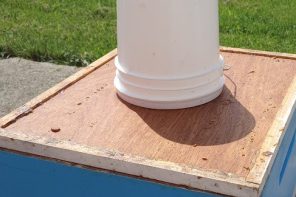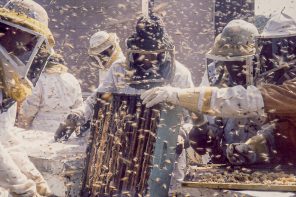Being Heard
By: Becky Masterman & Bridget Mendel
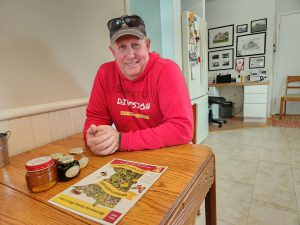
A check in with farmer Keith Johnson is always informative. Keith’s passion for farming and pollinators makes for an interesting perspective on bee advocacy issues. Photo credit: Rebecca Masterman
A check in with our favorite farmer and pollinator promoter, Keith Johnson, reminds us that we have some work to do. Today we’re sharing a few ideas that Farmer Keith thinks might help beekeepers promote bee health. From connecting to local government to reaching out about federal legislation, the more beekeepers promote bees and other pollinators, the better.
Let them know you are a beekeeper
Last year’s midterm election winners are now in office and it is a good time to introduce (or reintroduce) yourself. Politiwatch, a non-partisan tech non-profit, has an excellent search engine that will connect you to your local, state and federal representatives. From this site, you can navigate to websites where you can find the phone numbers, emails and letter addresses for those representatives: (https://whoaremyrepresentatives.org/).
Once you reach out, what should you say? It doesn’t have to be long (just sincere) to be impactful! Share who you are, and why you are concerned about the health of pollinators. In particular, underline that increasing habitat is a number one issue that you would like addressed!
2023 Farm Bill
Don’t let the name of this bill confuse you. If you eat, you are impacted by some part of the farm bill. Farm bill legislation is voted on every five years and the 2018 bill even has its own Wikipedia page (https://en.wikipedia.org/wiki/2018_United_States_farm_bill). This comprehensive legislation guides many programs overseeing many issues like nutrition (including the Supplemental Nutrition Assistance Program or SNAP), crop insurance, trade, horticulture and forestry programs. One area of the bill that has enormous potential to support bees and wildlife is the conservation programs. This year the Farm Bill is up for renewal and its conservation programs need your support.
If you bring up conservation programs with Farmer Keith (he usually gets there first though, he will tell you that enrollment in these programs is down. These programs incentivize farmers and private landowners to keep land out of production and instead adopt practices that support wildlife. Signed into law by President Ronald Regan in 1985, peak enrollment was at 36 million acres in 2007 (https://www.agweb.com/opinion/history-conservation-reserve-program). Unfortunately, enrollment has been under 25 million acres since 2014 (https://www.fsa.usda.gov/Assets/USDA-FSA-Public/usdafiles/Conservation/PDF/35_YEARS_CRP_B.pdf). Eleven million acres of potential conservation reserve program (CRP) habitat have been lost in under 20 years.
If you want to impress Farmer Keith, follow farm bill news and connect with your senators and representatives to let them know that you want them to promote and increase conservation programs in the 2023 farm bill.
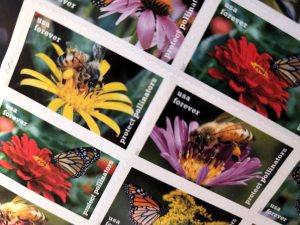
Time to send a letter (or email)? Reaching out to your representatives is a great and easy way to support your bees. Photo credit: Rebecca Masterman
Connect with your state and local agencies
We live in a state where each state-level agency and many cities have pro-pollinator directives. Although Minnesota has done an excellent job with promoting pollinator health with regard to habitat and pesticide use, there is always room for improvement. Farmer Keith’s advice when reaching out to your local and state agencies is to ask them how you and your beekeeper friends can help support their work supporting pollinators. You might be surprised about programs that already exist and are available to help efforts to increase pollinator habitat. We were (https://bwsr.state.mn.us/practices/pollinator/index.html)!
Join the Farm Bureau and/or Farmers Union
Both the Farmers Union and the Farm Bureau are organizations that advocate for farmers. Because they lobby for their members’ interests, membership could be in the best interest of beekeepers. Per the Minnesota Farmers Union website, one of the legislative priorities for 2022 was supporting pollinator habitat and research to promote crop pollination. Check out your state Farmers Union to see if pollinators have made the list of their legislative priorities (https://nfu.org/join/). While the Farm Bureau recognizes the importance of honey bees for crop pollination, when it comes to neonicotinoids their policy opposes a ban and encourages cooperation among regulators and stakeholders. Whether you agree or disagree, consider joining the bureau and let your voice be heard. As Farmer Keith says, the Farm Bureau and Farmers Union advocate for their members. Join and they will advocate for you (https://www.fb.org/about/join).
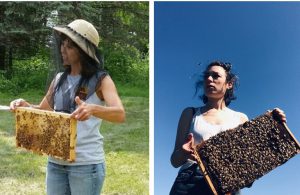
Becky Masterman led the UMN Bee Squad from 2013-2019. Bridget Mendel joined the Bee Squad in 2013 and has led the program since 2020. Photos of Becky (left) and Bridget (right) looking for their respective hives. If you would like to contact the authors with your bee advocacy success stories or thoughts, please send an email to mindingyourbeesandcues@gmail.com.
Research and Extension
Honey bees also need your help in the form of supporting research. We suggest checking in with your local university bee research and extension programs for an update on their work. Your support does not necessarily need to be financial. Staying connected with these groups might result in the opportunity to have your bees help answer research questions or simply give you the opportunity to share communications with other beekeepers.
Effort
Advocating for all the bees (honey and native) is a lot of work. After writing this to-do list of how we can work harder for our bees, it reminds us of how it is easy to feel behind in management tasks throughout the beekeeping season. So, our solution is to share the burden with other beekeepers and join a beekeeping club. Beekeeping clubs are a way to streamline bee advocacy and stay informed about emerging issues, whether political or biological. Remember, the club advocates for its members, so become a member!
Acknowledgments and Suggestions
The authors would like to thank Dr. Marla Spivak for helpful edits and suggestions.
If you thought Varroa was bad, we suggest reading John Miller’s article titled It’s Worse Than You Think (https://www.beeculture.com/its-worse-than-you-think/). We all need to be aware and ready for threats to bee health.







